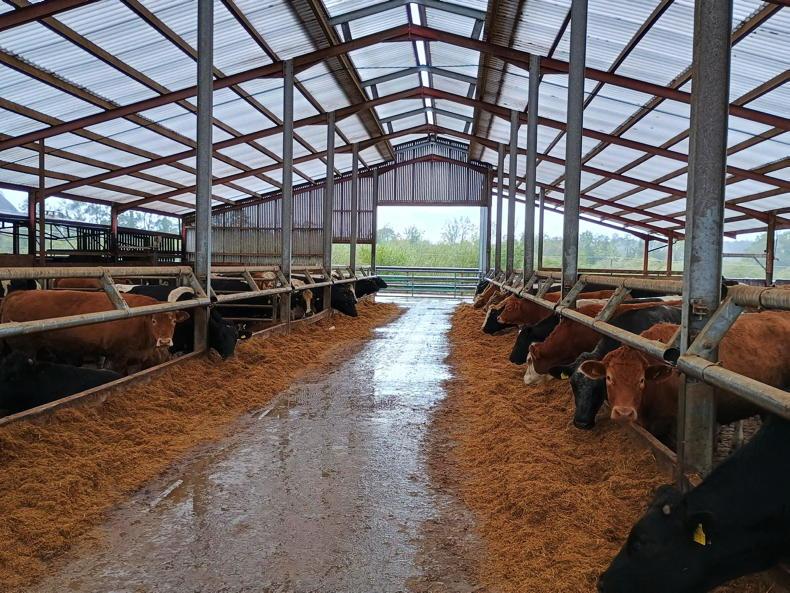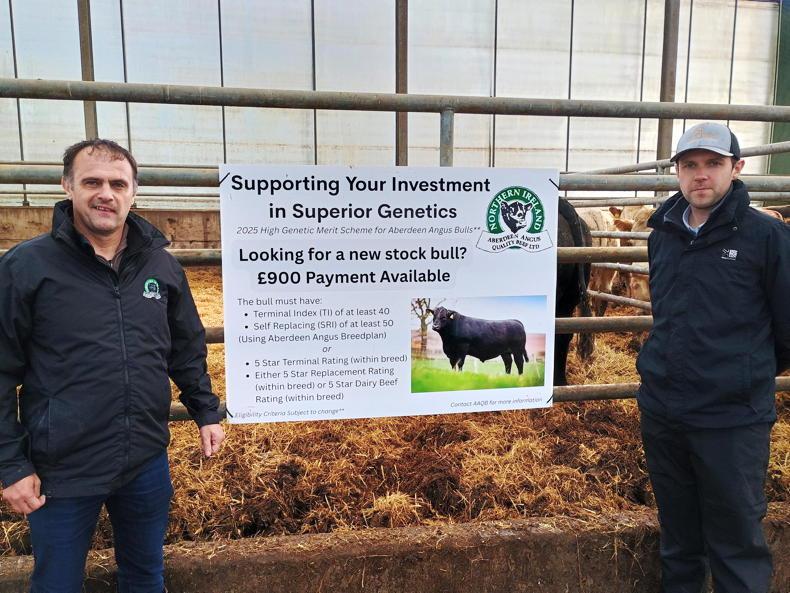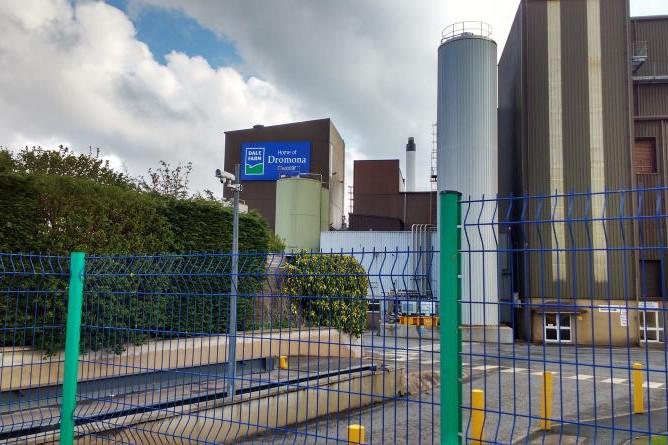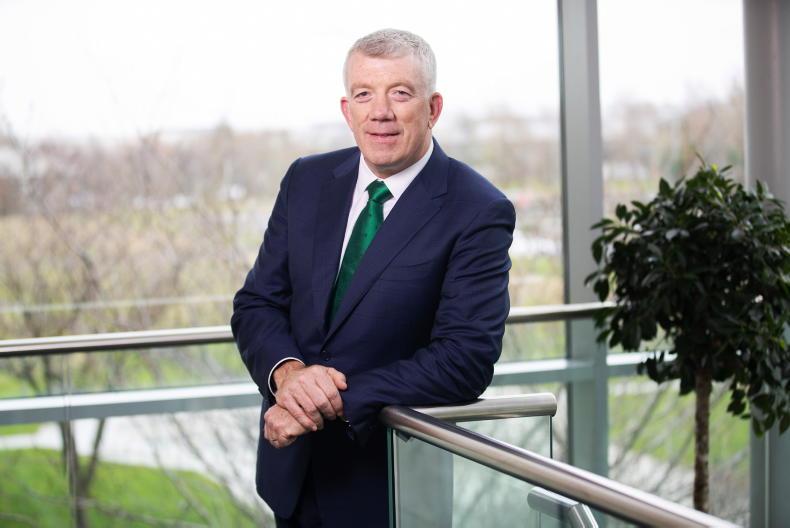Turnover at the Foyle Food Group (FFG) Holdings Ltd increased to £482m (€560.4m) in 2022, up from £410m (€476.7m) in 2021, though profits were down with operating profit at £12.9m (€15m) compared with £14.6m (€17m) the previous year and net profits were £9.3m (€10.8m), down from £10.7m (€12.4m) in 2021.
Despite a 17.6% increase in turnover, operating profit margin fell from 3.6% in 2021 to 2.7% in 2022. An interim dividend of £2.4m (€2.8m) was paid during the year.
The directors identified the increased turnover as being “heavily linked to the increase in cattle prices that have been prevalent throughout the year.”
Processing costs increased significantly with distribution costs at £17m (€19.8m), up 28% on the previous year.
As Foyle transports beef carcases from its factories in England for processing in Northern Ireland, the sharp increase in transport costs during the year contributed to this.
Administration costs increased by £1m (€1.2m) and while the number of people employed in the business was similar to the previous year, employee costs increased by £4.4m (€5.1m)to £43.1m (€50.1m), which works out at an average £32,164 (€37,400) per person working in the business.
The directors identify the key risks to the business as “the ongoing supply of cattle for processing, changing consumer behaviour, changing sales market, buy-sell margin and cost control”.
New markets
These risks are mitigated by strong customer service, identification of new markets and the development of relationships that allow external purchases as required.
Brexit is identified as an ongoing risk, though the directors are confident that the geographical spread of the group sites put the company in a strong position to adapt to the UK-EU relationship post-Brexit as it continues to evolve.
Background: Foyle Food Group
The FFG is headquartered in Omagh, Co Tyrone, and is owned by the Acheson family.
The business was established in the late 1970s with the opening of a multispecies factory in Campsie, Co Derry, with the factories in Omagh, Co Tyrone, and Cargins, Co Donegal, added in 1997 and 1998.
The business expanded further with the acquisition of factories in England in 2012 and 2013, bringing the processing capacity to around 350,000 cattle per annum.
The business is now exclusively cattle processing and has long-standing supply relationships with Tesco and burger chains in the UK.
It has also been to the forefront in developing international markets, but with Brazil using the available quota the US market isn’t currently viable.
While China reopened earlier this year, it is much less lucrative than it was previously. FFG also has rendering and anaerobic digestion businesses at its Campsie site in Co Derry.
The FFG is an anomaly in Irish beef processing in that it is the only significant beef processor that publishes annual accounts.
Foyle Food Group
a substantial player
in beef processing
Even if the operating profit is down compared with the previous year, £12.9m with a significant interim dividend paid remains a very healthy figure for this long-established family beef processing business.
In the Irish Farmers Journal factory leagues for 2022, the FFG Donegal factory topped the table in three categories and had two second places.
It was well placed in other categories as well and succeeded in attracting cattle from all over to travel to Donegal. Of course, farmers are made to earn whatever they get and FFG operates its own variation of the payment grid with higher prices focused on a narrower weight range than its competitors.
While the FFG does not have the scale of business that ABP, Dawn or Kepak have, it is a substantial player in beef processing and while it has just one factory in the Republic of Ireland along with two in the north, FFG provides significant competition for cattle on the island of Ireland.
Turnover at the Foyle Food Group (FFG) Holdings Ltd increased to £482m (€560.4m) in 2022, up from £410m (€476.7m) in 2021, though profits were down with operating profit at £12.9m (€15m) compared with £14.6m (€17m) the previous year and net profits were £9.3m (€10.8m), down from £10.7m (€12.4m) in 2021.
Despite a 17.6% increase in turnover, operating profit margin fell from 3.6% in 2021 to 2.7% in 2022. An interim dividend of £2.4m (€2.8m) was paid during the year.
The directors identified the increased turnover as being “heavily linked to the increase in cattle prices that have been prevalent throughout the year.”
Processing costs increased significantly with distribution costs at £17m (€19.8m), up 28% on the previous year.
As Foyle transports beef carcases from its factories in England for processing in Northern Ireland, the sharp increase in transport costs during the year contributed to this.
Administration costs increased by £1m (€1.2m) and while the number of people employed in the business was similar to the previous year, employee costs increased by £4.4m (€5.1m)to £43.1m (€50.1m), which works out at an average £32,164 (€37,400) per person working in the business.
The directors identify the key risks to the business as “the ongoing supply of cattle for processing, changing consumer behaviour, changing sales market, buy-sell margin and cost control”.
New markets
These risks are mitigated by strong customer service, identification of new markets and the development of relationships that allow external purchases as required.
Brexit is identified as an ongoing risk, though the directors are confident that the geographical spread of the group sites put the company in a strong position to adapt to the UK-EU relationship post-Brexit as it continues to evolve.
Background: Foyle Food Group
The FFG is headquartered in Omagh, Co Tyrone, and is owned by the Acheson family.
The business was established in the late 1970s with the opening of a multispecies factory in Campsie, Co Derry, with the factories in Omagh, Co Tyrone, and Cargins, Co Donegal, added in 1997 and 1998.
The business expanded further with the acquisition of factories in England in 2012 and 2013, bringing the processing capacity to around 350,000 cattle per annum.
The business is now exclusively cattle processing and has long-standing supply relationships with Tesco and burger chains in the UK.
It has also been to the forefront in developing international markets, but with Brazil using the available quota the US market isn’t currently viable.
While China reopened earlier this year, it is much less lucrative than it was previously. FFG also has rendering and anaerobic digestion businesses at its Campsie site in Co Derry.
The FFG is an anomaly in Irish beef processing in that it is the only significant beef processor that publishes annual accounts.
Foyle Food Group
a substantial player
in beef processing
Even if the operating profit is down compared with the previous year, £12.9m with a significant interim dividend paid remains a very healthy figure for this long-established family beef processing business.
In the Irish Farmers Journal factory leagues for 2022, the FFG Donegal factory topped the table in three categories and had two second places.
It was well placed in other categories as well and succeeded in attracting cattle from all over to travel to Donegal. Of course, farmers are made to earn whatever they get and FFG operates its own variation of the payment grid with higher prices focused on a narrower weight range than its competitors.
While the FFG does not have the scale of business that ABP, Dawn or Kepak have, it is a substantial player in beef processing and while it has just one factory in the Republic of Ireland along with two in the north, FFG provides significant competition for cattle on the island of Ireland.









SHARING OPTIONS